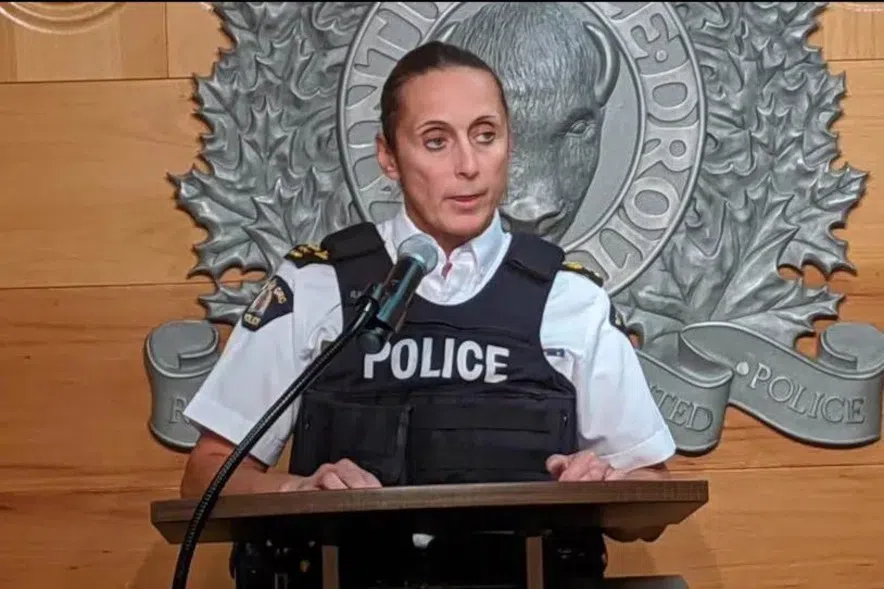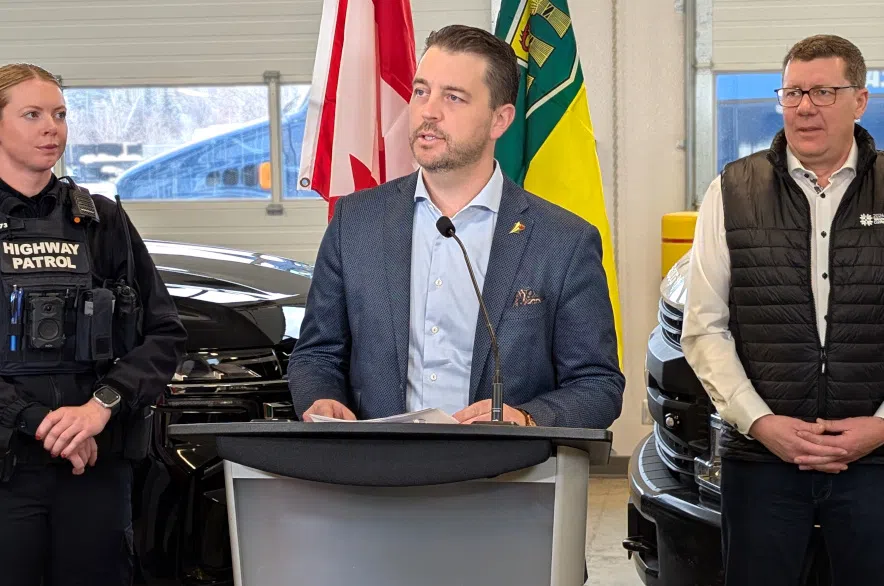Saskatchewan’s corrections, policing and public safety minister says he was surprised and disappointed when he found out Rhonda Blackmore had been removed as the head of the Saskatchewan RCMP.
“We, as a province, were very pleased with the service being provided by Rhonda Blackmore as our commanding officer, and if we could turn back the clock and put her back in that post, I think we would all be very well served for that,” explained Tim McLeod, speaking publicly about Blackmore’s removal for the first time during an appearance on the Evan Bray Show on Wednesday.
Read more:
- FSIN Chief ‘outraged, in shock’ over RCMP assistant commissioner removal
- Sask. RCMP commander talks crime stats, human trafficking on Evan Bray Show
- ‘This is huge for us:’ Sask. RCMP commander thrilled about possible new funding
Listen to the full interview with McLeod:
Blackmore was removed from her post in early June. In a message she sent to RCMP employees in Saskatchewan, she said the decision was made by the senior executives at national headquarters. She said the decision to remove her from her role was prompted by anonymous complaints.
She was subsequently moved to the position of assistant commissioner of indigenous and support services with the RCMP.
McLeod praised Blackmore’s work in Saskatchewan, saying she was a great partner who helped see the province through some difficult times, pointing to the James Smith Cree Nation stabbings as an example.
He said decision making around RCMP leadership lies with RCMP command. McLeod said his deputy minister was contacted and informed about the change, but was given no details as to why the decision was made.

Rhonda Blackmore was removed as head of the Saskatchewan RCMP in June, because of anonymous complaints, according to a letter she sent to RCMP employees in the province. (980 CJME file photo)
“Due to privacy, we don’t have any details around the circumstances and really have been left wondering is she gone temporarily? Is she gone permanently?” said McLeod.
He said it didn’t go unnoticed within government that the decision to remove Blackmore was made while Saskatchewan’s was in the middle of a state of emergency due to wildfires.
“If it was an urgent situation such that she needed to be removed during a provincial emergency, I would certainly expect that there was cause for that and that we would be given some information about that cause, but we have very few details at this point in time,” he explained.
The minister said he’s sent a letter to his federal counterpart asking for answers about why Blackmore was removed, why it was done during an emergency, and how long the whole process will take.
McLeod said an interim commander has been installed in Saskatchewan and the province is happy to work with him. The minister said whoever the new, permanent commander is, he hopes they’ll have the same understanding of the unique challenges of policing in Saskatchewan that Blackmore did.
Minister shares update on wildfires
Bray also asked McLeod about the worsening wildfire situation in the province.
Fire is closing in on some communities in the north, but the fire and smoke has compromised at least one access road to the English River First Nation.
“That’s a situation that the (Saskatchewan Public Safety Agency) is monitoring very closely,” said McLeod. “But with the SPSA assistance, they’re escorting through essential traffic – making sure the resources that those communities need during this period of time are still getting through.”
There’s always a possibility another state of emergency could be declared for Saskatchewan, according to McLeod, but he said the government isn’t considering that option right now.
The provincial government recently announced $20 million for communities and people affected by the wildfires. McLeod said that’s on top of things like insurance and the provincial disaster assistance program.
The money is meant to be used for debris removal, environmental testing, expanding or maintaining landfills during the cleanup and help with project management.
McLeod said the extra money is in place because the government recognized the need for it.
“This is an additional layer of support from the provincial government that can assist communities as they clean up and are able to begin rebuilding,” he explained.
The cleanup will be led by the communities themselves, and McLeod said a recovery task force will be available to help.











